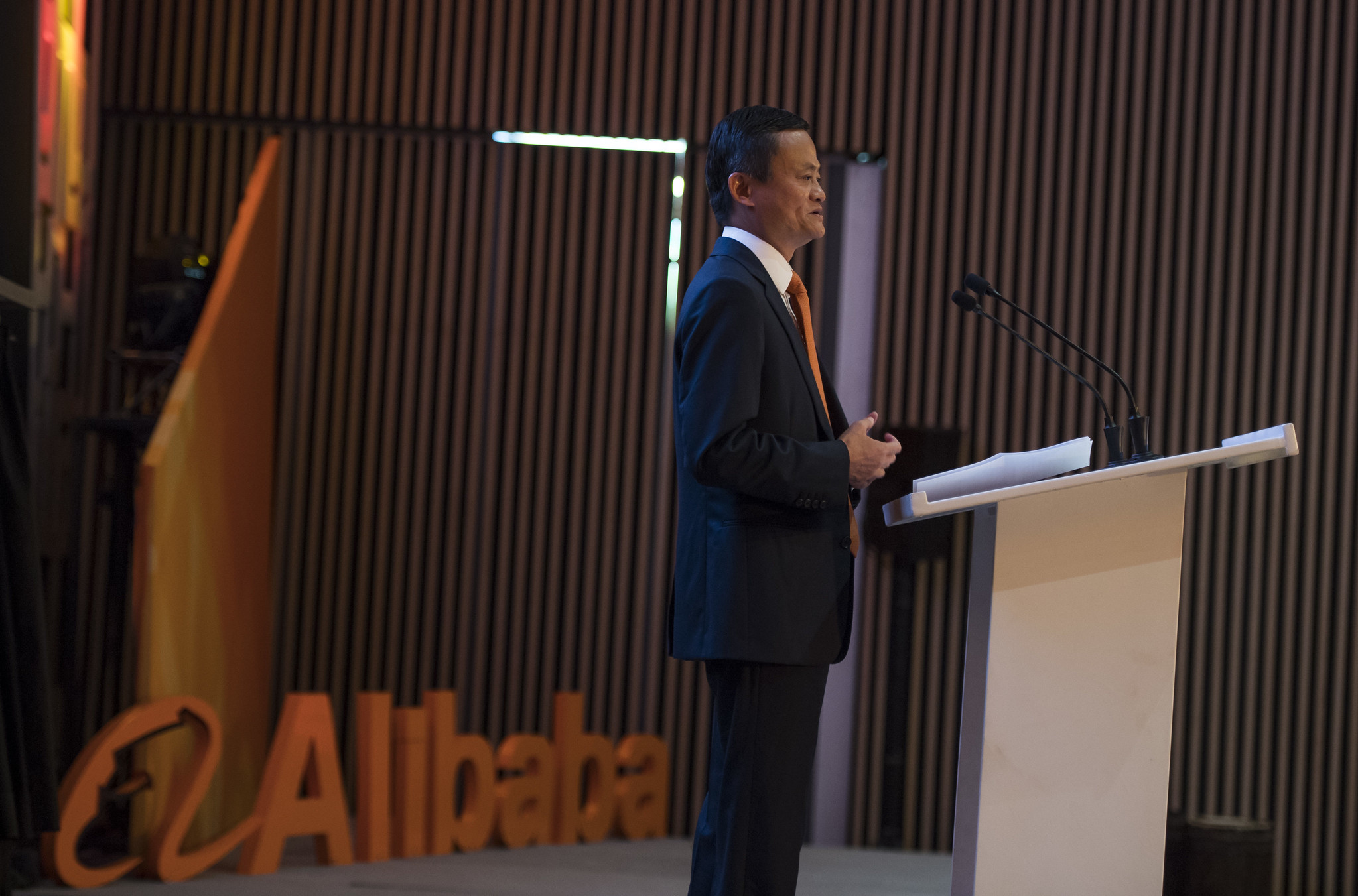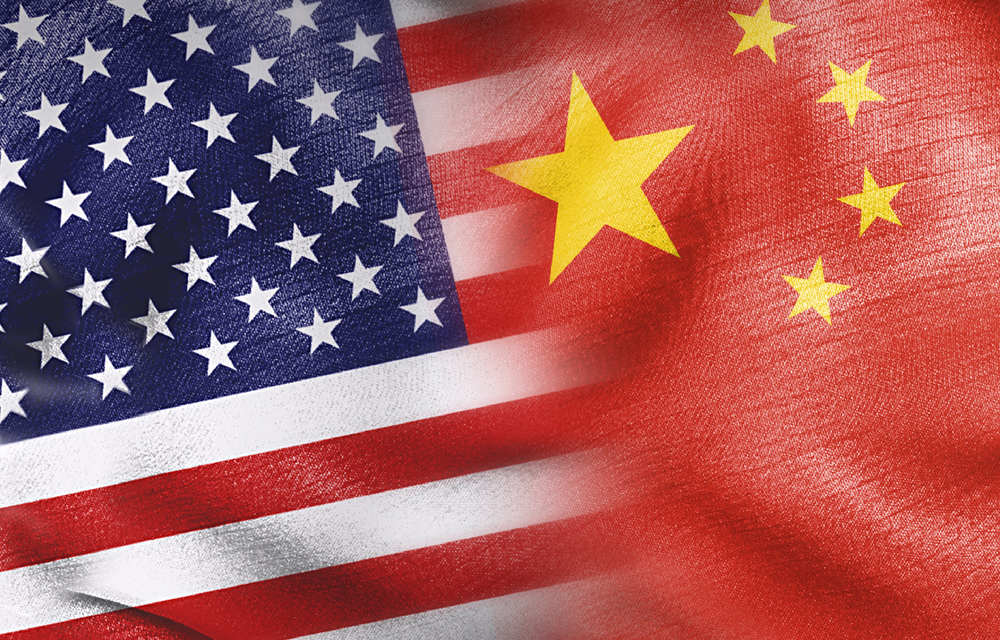Ant Group IPO Suspended; Five-Year Plan Unveiled
Lawfare’s biweekly roundup of U.S.-China technology policy and national security news.

Published by The Lawfare Institute
in Cooperation With

Chinese Regulators Suspend Ant Group’s IPO
On Nov. 3, Chinese regulators announced the suspension of Ant Group’s initial public offering, taking the financial world by surprise. The financial technology giant was poised to break the record for the world’s largest initial public offering (IPO): Ant Group was estimated to raise approximately $34.4 billion in capital, outdoing the previous record set in 2019 by Saudi Aramco’s $29.4 billion IPO. The company would have started trading on the Hong Kong and Shanghai exchanges on Nov. 5.
The move brings simmering tensions between Ant and Chinese regulators to a head after Jack Ma, Chinese billionaire and head of Ant Group, criticized the “outdated supervision” of Chinese regulators in late October. Ma, Ant’s chief executive Simon Hu and executive chairman Jack Ying were summoned to an unusual meeting with senior representatives of four Chinese regulatory bodies on Monday. Chinese regulators have since issued new regulations targeting financial technology companies, requiring additional financial disclosures ahead of IPOs and imposing new restrictions on lending practices
Ant Group operates as a “virtual financial services mall for everything from loans to mutual funds, insurance policies and travel bookings.” Its signature offering is Alipay, a virtual payments and lifestyle platform. Today, Ant has more than a billion active users, handling more than $17 trillion in digital payments in mainland China between June 2019 and June 2020. The move from Chinese regulators confirms that the government sees Ant Group (previously Ant Financial) as a financial services firm, not a tech firm. As a financial services entity, the company is subject to higher scrutiny and may face greater skepticism from investors about its growth prospects. Ant has long toed the line with Chinese regulators, with its popular service offerings and investment products sparking fear of destabilization in China’s traditional banking sector.
Ant Group would have gone public with an estimated total valuation of $310 billion, rivaling the size of JPMorgan Chase, the most valuable U.S. bank. Ant’s IPO was also set to beat its sister company, Alibaba, which launched on the New York Stock Exchange in 2014 with an IPO of $25 billion. The group chose to forgo New York and launch instead on the Shanghai and Hong Kong stock exchanges, signaling the possibility of raising massive amounts of capital without reliance on U.S. markets. Commentators highlighted Ant’s abstention from U.S. exchanges as its strategic response to recent punitive actions by the Trump administration against Chinese companies. Now, analysts say they will have to reassess the value of Ant and other Chinese companies attempting to go public in Chinese markets.
Beyond the domestic scrutiny from Chinese regulators, Ant also faces potential sanctions from the Trump administration over national security concerns. But, with a user base chiefly in mainland China, any U.S. sanctions on Ant Group are likely to be merely symbolic. Ant’s long-term earnings potential may also be affected by China’s plans to roll out a digital currency. The Chinese Ministry of Commerce is gradually expanding trials of the digital yuan. Ant has stated that it lacks “sufficient visibility” to assess the impact of a digital currency on the electronic payment industry.
CCP Announces Five-Year Plan
On Oct. 29, the Chinese Communist Party’s (CCP’s) Central Committee unveiled a final draft of China’s next five-year plan, the medium-term outline of state development goals that has been a hallmark of Chinese governance since 1953. The plan will be finalized in 2021 at the National People’s Congress.
The plan, written at the Central Committee’s fifth plenum, a semiannual policy meeting of top party leadership, suggests that increasing self-reliance and independence—particularly in advanced technologies—appears to be the main emphasis of Chinese governance between now and 2025.
Technological advancement in hardware manufacturing, cyber capabilities and the growing digital economy are now the primary prongs of China’s effort toward self-sufficiency. Minister of Science and Technology Wang Zhigang commented: “It is the first time ever in the history of our party’s five-year plans … that [China] is placing the plans on science, technology, and innovation before all other sectors.” In the next chapter of Chinese development, policymakers will aim to strengthen the tech industry’s national champions; China’s investment in its tech behemoths stands in contrast to the United States’s growing political hostility to big tech.
The five-year plan states several additional goals, including continued financial reforms and “dual circulation,” an economic plan that emphasizes growth in domestic consumption and supply-side reforms. These policies have been spearheaded by top economic advisor and Vice Premier Liu He. The plan’s elements, which also include the promotion of Taiwanese reunification, are largely unsurprising to China watchers.
In reflecting on the party’s last five-year plan, the fifth plenum communique declared victory in China’s effort to become a “moderately prosperous” nation by 2021. China’s gross domestic product (GDP) now totals about 65 percent of the United States’s—up from 40 percent in 2010.
For the first time, the plenum communique also mentioned a number of 15-year goals: growth in GDP per capita to reach the level of a moderately developed nation, breakthroughs in property reform, and the formation of a “great socialist culture.” The new set of aims has fueled preexisting speculation that President Xi Jinping plans to remain in power until 2035.
Other News
China Announces Plans to Sanction U.S. Defense Contractors Over Taiwan Arms Sales
On Oct. 26, China announced prospective sanctions on major U.S. defense contractors over proposed weapons sales to Taiwan. Lockheed Martin Corp., Raytheon Technologies Corp. and the defense unit of Boeing Co. may face Chinese sanctions if the U.S. State Department’s $1.8 billion arms deal with Taiwan is green-lit. The State Department will send the plan to Congress this week for final approval.
The Chinese Foreign Ministry spokesman, Zhao Lijian, told reporters in a press conference on Oct. 26 that China “firmly opposes” U.S. arms sales to Taiwan, which “severely undermine China’s sovereignty and security interests.” Condemning a U.S. sale of 66 Lockheed F-16 Block 70 aircraft to Taiwan two months ago, Zhao indicated that the sales “violate the one-China principle ... and will have a major impact on U.S.-China relations.”
Taiwan has declared its intentions to strengthen its defense capabilities against increasing threats from Beijing, which lays claim to the democratically controlled, self-ruled island.
No details on the nature or duration of the threatened sanctions have yet been announced. Some commentators believe China may enact customs blockades against relevant materials or products; others expect formal sanctions on the companies themselves.
Commentators are also split on how big an effect any sanctions would have, given the existing embargo on U.S. weapons sales to China in place since the Tiananmen Square crackdown in 1989. Boeing earned just over 7 percent of its global revenue in China last year, though this figure encompasses civilian activities not under threat of sanction. Lockheed draws less than 1 percent of its global revenue from China. Raytheon is poised to take a greater hit as its subsidiary engine manufacturer, Pratt & Whitney, is a major player in China’s aviation sector.
U.S. and India Sign Landmark Security Agreement
On Oct. 26, India and the United States signed a landmark defense agreement. The pledges of additional military cooperation were exchanged at the annual 2+2 ministerial dialogue between U.S. Secretary of State Mike Pompeo, U.S. Secretary of Defense Mark Esper, and their Indian counterparts, Foreign Minister Subrahmanyam Jaishankar and Minister of Defense Rajnath Singh.
The deal, entitled “The Basic Exchange and Cooperation Agreement on Geospatial Cooperation,” provides for the sharing of military information—including data collected by U.S. satellites—and enhanced bilateral communications, particularly with respect to Chinese activities in the Indo-Pacific. This bilateral defense agreement is one of a series initiated by the 2016 Logistics Exchange Memorandum of Agreement and continued with the 2018 Communications Compatibility and Security Agreement. The United States’s support for and ties with India continue to grow: In 2019, the two countries conducted the first land, sea and air joint exercise in the history of U.S.-India military exchanges.
Some commentators see the strengthened ties between the United States and India as a joint play against China. India has been in a military stand-off with China in the strategically valuable region of Ladakh for months. Ladakh holds historical and cultural importance for both countries, having been the site of intermittent showdowns between the two powers since 1962.
Pompeo’s Rhetoric on China Not Matched by Hosts
Pompeo spent the last week of October on a tour of Asia: In addition to India, he visited Sri Lanka, Indonesia and Vietnam. The CCP has been a constant theme in his remarks. In Sri Lanka and the Maldives, he called the CCP a regional “predator,” “lawless and threatening.” In Indonesia, Pompeo emphasized China’s “unlawful claims … in the South China Sea.” And just after Pompeo’s visit to Vietnam, a State Department spokesperson reiterated U.S. support for Vietnamese sovereignty over Vanguard Bank, a Vietnam-controlled, oil-and-gas-rich basin to the west of the Spratly Islands, which was the subject of a dispute between China and Vietnam in the summer of 2019.
The United States’s aggressive rhetoric was generally not shared by its regional hosts. Although Pompeo and Esper explicitly designated the U.S.-India defense agreement as a move to confront Chinese “threats” and “increasing aggression” in the region, the Indian representatives were more circumspect. When asked whether China was a motivating factor for the new defense agreement, Jaishankar answered that the agreement was motivated by the national interests of India and the United States. Similarly, Vietnamese Prime Minister Nguyen Xuan Phuc made no mention of China during the secretary’s visit. As Indonesian Foreign Minister Retno Marsudi put it in September: “We don’t want to get trapped by [the U.S.-China] rivalry.”
In remarks on Oct. 27, Chinese Foreign Ministry Spokesman Wang Wenbin urged Pompeo to “stop sowing discord between China and regional countries.”
Huawei’s Meng Wanzhou Wins Small Victory in Extradition Case
Huawei executive Meng Wanzhou—currently released on bail in Canada pending extradition to the U.S., where she faces criminal charges—won a small victory in Canadian courts this week. She was arrested at Vancouver International Airport in December 2018. The U.S. alleges that Meng misled HSBC Bank regarding Huawei’s business dealings with Iran, causing the bank to violate U.S. sanctions on Iran.
In her ruling, Justice Heather Holmes permitted Meng’s lawyers to admit limited new evidence, also allowing Meng’s argument that the U.S. fraudulently misrepresented evidence against her in its extradition claim. Meng, who has two homes in Canada, is the daughter of Huawei founder Ren Zhengfei and also serves as the company’s chief financial officer. The extradition case, likely to drag on for years, has created significant diplomatic tensions among China, the United States and Canada.
Commentary
On Oct. 27, Sens. Robert Menendez and John Corbyn introduced a bipartisan resolution to designate the Chinese state actions against Uighurs in Xinjiang as a genocide. The resolution alleges involuntary sterilization, forced labor, torture and family separation policies, among other human rights abuses.
U.S. National Security Adviser Robert O’Brien writes for Foreign Affairs on the global spread of CCP ideology.
ChinaFile publishes an extensive report on the current state of play in Chinese surveillance techniques. The authors emphasize the ubiquity of surveillance in China, Chinese officials’ perception of surveillance as an essential element of governance and the fragmentation and lack of uniformity in the surveillance system.
The U.S. Department of Justice charged eight people with harassing and threatening Chinese citizens residing in the United States, the Wall Street Journal reports. The individuals charged are allegedly part of China’s extraterritorial expansion of its anti-corruption efforts. Rohini Kurup summarizes the developments for Lawfare.
For the University of Pennsylvania’s Project on the Future of U.S.-China Relations, Robert D. Williams untangles U.S. security concerns over Huawei and TikTok, tracing the securitization of technology policy in U.S.-China relations in the realms of 5G and artificial intelligence. Sheena Greitens contributes a paper on China’s export of surveillance and implications for U.S. policy, while Julia Voo writes on the importance of a proactive approach to setting technological standards.
Eileen Guo considers the ramifications of the WeChat ban on Chinese American users for MIT Tech Review.
The Mercator Institute for China Studies (MERICS) reports a flurry of science-and-technology-related activity by top CCP leaders in September.
Plamen Tonchev discusses with MERICS’s Gerrit Wiesmann Xi’s recent announcement of a goal to make China carbon-neutral by 2060, and how China may utilize its excess solar capacity to power the Belt and Road Initiative.
Tech publication Rest of World does a deep dive on creeping censorship of history in Hong Kong. Rest of World also reports on increasing pro-nationalist trolls on Weibo, China’s Twitter-equivalent.
Economic historian Adam Tooze joins Lawfare’s ChinaTalk podcast to discuss world history and its echoes in China’s domestic and foreign policy.
Christopher Layne comments for Foreign Affairs on the potential return of great power war.
Jude Blanchette and Scott Kennedy “read the tea leaves” in their analysis of China’s Fifth Plenum for the Center for Strategic & International Studies.
Lucio Blanco Pitlo III analyzes the dilemmas facing the Quad—the trans-Pacific grouping of the United States, India, Japan and Australia—if they move toward institutionalizing the alliance.
Lauren Dudley continues a discussion of Huawei’s expansion in Russia for the Net Politics blog at the Council on Foreign Relations.
Peter Berkowitz, a member of the U.S. State Department’s Policy Planning Staff and a Hoover Institution affiliate, writes for Real Clear Politics on the strategic intent behind the “China Challenge.”
Coby Goldberg, a Center for New American Security researcher, writes for Divergent Opinions on the philosophical reasoning behind and the strategic implications of Xi’s view of the world and its future.
Gideon Rachman writes for the Financial Times that China should not rest on its coronavirus laurels just yet.






